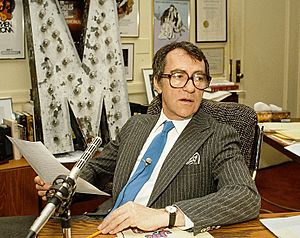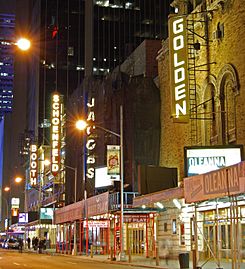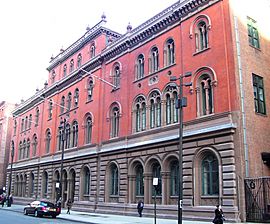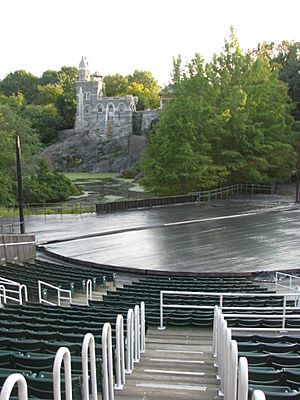Joseph Papp facts for kids
Quick facts for kids
Joseph Papp
|
|
|---|---|

Papp in 1982
|
|
| Born |
Joseph Papirofsky
June 22, 1921 Brooklyn, New York City, New York, U.S.
|
| Died | October 31, 1991 (aged 70) New York City, New York, U.S.
|
| Occupation | Producer, director |
| Spouse(s) | Peggy Marie Bennion Gail Bovard Merrifield |
| Children | Tony, Miranda, Barbara, Susan, Michael |
Joseph Papp (born Joseph Papirofsky; June 22, 1921 – October 31, 1991) was an American theatrical producer and director. He created a special place called The Public Theater in New York City. Here, he focused on showing new plays and musicals all year round.
Papp also started Shakespeare in the Park. This program offered free plays by William Shakespeare to everyone. He also helped other smaller theaters grow and worked to save the historic Broadway Theatre District.
Contents
Early Life and Background
Joseph Papp was born as Joseph Papirofsky in Brooklyn, New York City. His parents, Yetta and Samuel, were Jewish immigrants from Russia. His mother was a seamstress, and his father made trunks. Joseph learned from playwright Eulalie Spence when he was in high school.
Creating Free Theater for Everyone
Papp started the New York Shakespeare Festival in 1954. Today, it is known as Shakespeare in the Park. His goal was to make Shakespeare's plays available to everyone for free. In 1957, he was allowed to use Central Park for these free shows. Even after his death, these free performances continue every summer at the Delacorte Theatre in Central Park.
Founding The Public Theater
Joseph Papp spent much of his career making sure people could see free Shakespeare plays in New York City. A key moment was his 1956 show of Taming of the Shrew. It was performed outdoors in the East River Amphitheatre. A famous critic, Brooks Atkinson, praised Papp's idea in The New York Times.
After setting up a permanent home for his free summer Shakespeare shows at the Delacorte Theater, Papp wanted a theater for year-round plays. He found the old Astor Library building on Lafayette Street. In 1967, he rented it for only one dollar a year from the city. This building was the first to be saved from being torn down under New York City's landmark preservation law.
After a lot of work, Papp moved his team to the new Public Theater. He hoped to attract new audiences for fresh and exciting plays. At the Public Theater, Papp started focusing more on new plays instead of just Shakespeare.
Many important plays were shown at the Public Theater. These included No Place to Be Somebody by Charles Gordone. This was the first off-Broadway show and the first play by an African American to win the Pulitzer Prize. Papp also produced plays by David Rabe and Jason Miller. He felt his productions of Rabe's plays were very important. In 1985, Papp produced The Normal Heart by Larry Kramer. This play talked about the AIDS crisis and how some people were ignored.
Papp is also famous for four shows that later moved to Broadway. These were Hair, The Pirates of Penzance, For Colored Girls Who Have Considered ... / When the Rainbow Is Enuf, and A Chorus Line. A Chorus Line started with interviews of dancers at the Public Theater. Papp kept the rights to A Chorus Line. The money earned from this show helped support all of Papp's other theater work. A Chorus Line won nine Tony Awards, including Best Musical. It also won the 1976 Pulitzer Prize for Drama. It ran for 6,137 performances, becoming the longest-running Broadway show at that time.
Outdoor Performances at the Delacorte Theatre
The Delacorte Theater shows introduced many new actors to free outdoor Shakespeare. Many famous actors performed there. For example, George C. Scott won an award for his role in Richard III in 1958. Colleen Dewhurst played many strong female roles. Stacy Keach and Sam Waterston both played Prince Hamlet.
Other notable performances included Meryl Streep in Measure for Measure. James Earl Jones played King Lear in 1973. Raul Julia played many roles, including Othello. In 1968, Martin Sheen played Romeo.
Shakespeare in the Park was not only for Shakespeare. In 1977, Gloria Foster was in the Greek play Agamemnon. Papp also loved Gilbert and Sullivan operas. In 1980, he put on a new version of The Pirates of Penzance. This show was a huge hit and moved to Broadway. It ran for over 800 performances and won several Tony Awards.
Papp believed in non-traditional casting. This meant he used actors of different backgrounds and ethnicities in his plays. He was also a strong supporter of fairness and equality for all people.
Helping New York Theater Grow
Papp also helped other theaters across New York City. He often used money from successful Broadway shows, like A Chorus Line, to support smaller Off Broadway theaters. He helped theaters like Theatre for a New Audience. He also took a special interest in the Riverside Shakespeare Company. He helped them with their tours of free Shakespeare plays in New York Parks.
Saving Historic Theaters

Papp cared deeply about saving the historic Broadway/Times Square Theater District. In the early 1980s, he helped start the "Save the Theatres" movement. Many actors, directors, and producers joined him. Their goal was to protect old playhouses that were in danger of being torn down. This effort began when the Morosco and Helen Hayes theaters were set to be demolished in 1982.
Even though Papp could not save the Morosco or Helen Hayes theaters, his efforts made a big difference. The "Save the Theatres" movement helped slow down the destruction of the old Theater District. This led to many other historic playhouses being saved. It also helped keep the special feeling and history of the area.
Death
Joseph Papp passed away from prostate cancer on October 31, 1991, at age 70. He is buried in the Baron Hirsch Cemetery on Staten Island. His son, Tony, had died a few months before him. Papp was survived by his fourth wife, Gail Merrifield Papp, who also worked at the Public Theater.
Legacy
Thanks to Joseph Papp's "Save the Theatres" effort, the Theater District is still a major attraction in New York City today.
In 2000, the Joseph Papp Children's Humanitarian Fund was created. Papp also helped start the Foundation for Ethnic Understanding. This group works to build stronger connections between different communities.
A book about his life, Joe Papp: An American Life, was written by Helen Epstein in 1996. The song "Joe Papp" by William Finn is also dedicated to his contributions to theater.
Recognition
- 1986: Received the Golden Plate Award from the American Academy of Achievement.
- 1992: The Public Theater was renamed the Joseph Papp Public Theater in his honor.
- 2017: The intersection of Lafayette Street and Astor Place, where the Public Theater is located, was co-named in honor of Joseph Papp.
See also
 In Spanish: Joseph Papp para niños
In Spanish: Joseph Papp para niños
 | Georgia Louise Harris Brown |
 | Julian Abele |
 | Norma Merrick Sklarek |
 | William Sidney Pittman |



